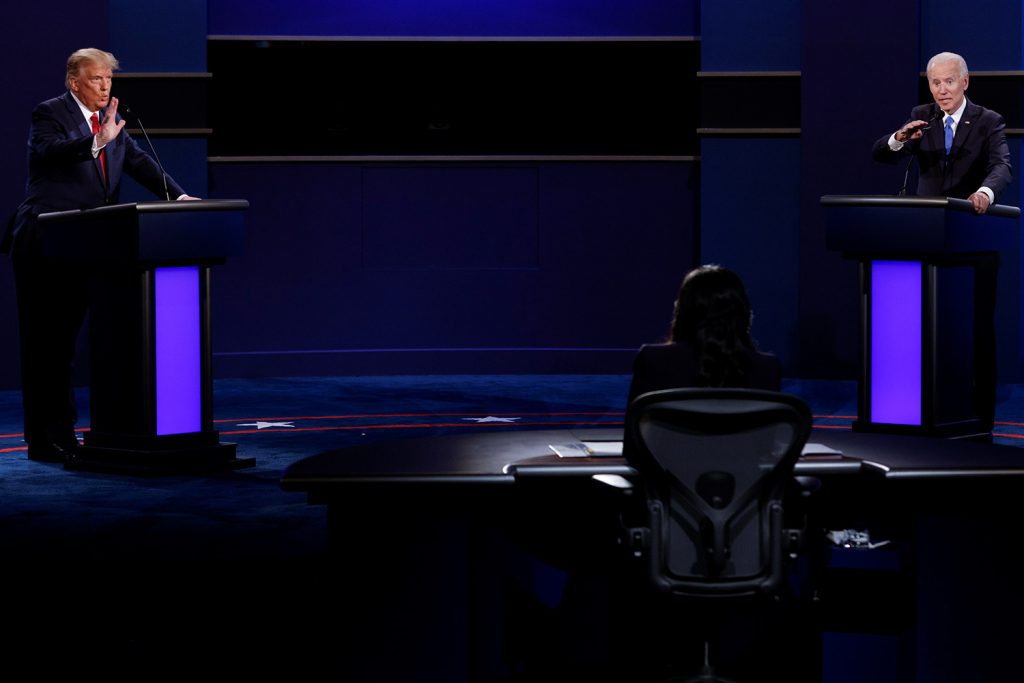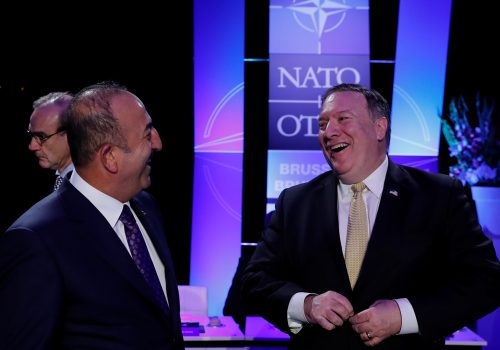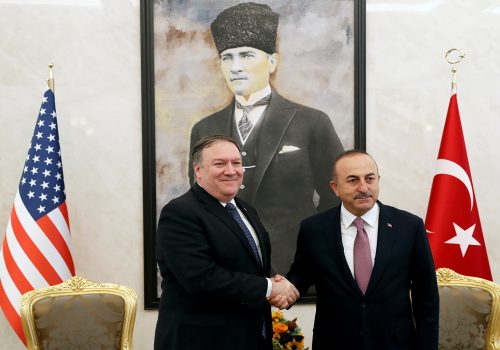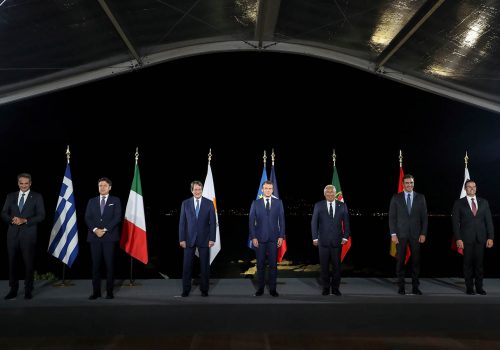Atlantic Council IN TURKEY’s online blog TURKEYSource(*) launches a short series of blogs based on experts’ independent opinions covering a wide range of topics related to the US-Turkey relations in the context of the upcoming US Elections.
The foundation of the US-Turkey partnership is centered on the NATO alliance. At times, US President Donald Trump has expressed skepticism about NATO, but at the same time his rhetoric has been credited by some for encouraging member states to meet their obligations to increase defense spending. Former Vice President Joe Biden, meanwhile, represents a much more traditional US approach to NATO. At a time of rising challenges from powers such as Russia and China, the 2020 US presidential election offers two truly contrasting visions for the future of US engagement in the world. The Trump administration has preferred to pursue its foreign policy goals through bilateral relationships based on more narrowly defined national interests, while Vice President Biden has suggested a return to greater multilateralism and more emphasis on values.
We asked three experts to share their thoughts on which policy would best fit Turkey’s perspective and interests, how a Biden administration would affect US foreign policy towards the Middle East as well as in the Mediterranean, and whether the United States can play a mediating role between Turkey and Israel. Additionally, we asked our contributors their thoughts on the prospects of increased economic engagement between the United States and Turkey on trade and investment, including energy, as well as technology in the case of four more years of President Trump versus a Biden administration, and whether is there any potential for practical progress towards the $100 billion bilateral trade goal or a free trade agreement.
Biden’s multilateralism would be to Turkey’s benefit, but economic engagement may stall
Over the long term and strategically, a return to greater multilateralism and more emphasis on values by the United States would serve Turkish interests.
Turkey is the only secular and democratically-governed Muslim-majority country with a vibrant free market economy that enjoys decades-old ties to all western-oriented institutions including NATO. Turkey’s armed forces are the second-largest NATO military force with recent combat experience and an impressive historical record in terms of multilateral peace and stability engagements in conflict zones ranging from Bosnia and Somalia to Kosovo and Afghanistan. The unique added value of Turkey’s membership in such institutions will be more recognized in a multilateral world order and it will be easier to leverage the cultural and religious diversity that Turkey brings to the table in a value-based environment rather than one that is solely interest-based and focused on bilateral relations.
The core fundamentals of US foreign policy vis-a-vis the Middle East or even Turkey will not change if Biden is elected in November. Biden personally knows all the actors in President Recep Tayyip Erdoğan’s administration. As vice president, Biden took the lead in representing the United States after the Gülenist coup attempt in July 2016.
Like President Erdoğan, Biden is a pragmatic politician. I believe they would get along much better than most analysts seem to believe. The only real difference will be that Biden will defer more to the opinion of career professionals within key institutions such as the State Department and the Pentagon. The latter could produce a tougher stance towards Turkey on issues such as the S-400 defense system, but over the long run, the basic fundamentals would not change.
Similarly, a Biden administration will not make drastic changes in US policy towards Israel and the larger Middle East and is also likely to continue supporting the recent rapprochement between the Gulf countries and Israel. I would expect Biden to try and mediate between Turkey and Israel. As to the Eastern Mediterranean disputes including Libya, I strongly believe a Biden administration will take a similar stance and favor meditation.
However, Biden’s Syria policy and his approach to the People’s Protection Units (YPG) might be the biggest risk for Turkey if he assumes the presidency in 2021. I would strongly urge Biden and his key staff to immediately disengage the United States from Kurdistan Workers’ Party (PKK) elements in Syria.
There is so much potential on the economic front that officials on both sides are talking about quadrupling the existing trade flow. As a member of the Executive Board of TAIK (The US-Turkish Business Council), I am very encouraged by recent bilateral economic developments and trends. For example, liquefied natural gas (LNG) imports from the United States have almost tripled in the last few years. Turkey is still buying more LNG from other countries, but this is where political support can weigh in. If decision-makers can solve the disagreements and focus on more prosperity instead of more conflict, there is no reason why Turkey would not prefer US products. Similarly, Turkish products are known for being “Chinese prices at German quality.” At a time that many US importers are looking for alternatives to China, why not leverage Turkey’s capabilities or team up to compete with China in Africa? It is however very difficult to build on such dynamics while the US Congress is threatening sanctions and newspapers are filled with negative stories about Turkey. We must collectively invest in stability and move forward.
From an economic perspective, four more years of Trump would probably be welcomed by business communities because there is substantial existing outreach on this front that might hit a wall if the US administration changes. However, no matter who comes to power in November, the challenges of the pandemic is going to make it quite hard for any administration to make desired level of progress towards 100 billion bilateral trade goal or a free trade agreement in at least near future.
Namık Tan is the former ambassador of the Republic of Turkey to the United States.
A Biden presidency could reset an adrift Turkey
The Trump administration not only pursued a foreign policy of more narrowly defined national interests, but also made its policymaking more transactional. A president who has neglected values, which previously sat at the heart of the transatlantic alliance, did not help an already struggling NATO in a post-Cold War era. This focus on national interests played into the hands of the Turkish government, which preferred to discredit NATO and its leading members, especially following the coup attempt of July 2016. The Turkish government implied that the allies were supporting the coup plotters The Trump administration’s opposition to multilateralism coupled with the Erdoğan government’s anti-Western populist discourse paved the way for Ankara to further drift away from the NATO framework. Although the growing relationship between Ankara and Moscow is highly transactional and dependent on Turkey’s security concerns in Syria, the intensification of the defense cooperation has gone beyond short-term interests.
A Turkey who has lost both its NATO anchor and the potential of full EU membership (given the lack of appetite on both sides), would lose a great deal of its strategic value in its region. Turkey can never fully realize its potential if democratic values keep being degraded. Likewise, in the 21st century NATO can never fully realize its potential as a military alliance if it cannot connect with civil society. For Turkey to stay on the democratic path, its NATO membership must play a role. That is why Democratic presidential candidate Joe Biden’s vision could be helpful to resetting Ankara’s perspective in the next decade.
The United States has always had the potential to play a mediating role between Turkey and Israel. Former President Barack Obama’s intervention in April 2013 to force Israeli Prime Minister Benjamin Netanyahu to pick up the phone and apologize to Erdoğan for the killing of Turkish citizens on the Mavi Marmara flotilla is a perfect example. We know that the United States was always a hidden actor in the talks that eventually led to a rapprochement between the two countries in 2016. However, the Trump administration’s imprudent approach of empowering Israel and its decision to move the embassy to Jerusalem led to a loss of confidence in Turkey. US foreign policy will need to undergo a major shift if Washington is to regain its balancing role in the region. There is a similar kind of distrust in Ankara regarding Washington’s relations with the Gulf countries, since the Trump administration openly took the side of Saudi Arabia and UAE on various occasions.
Although Turkey-US trade has real potential, announcing a $100 billion bilateral trade goal was a tactic to divert attention from the mounting problems between the two countries. When President Erdoğan was finally invited to Washington in November 2019 to meet President Trump, there was a desperate need for a positive item on the agenda given the outcry in the United States against Ankara’s ‘Operation Peace Spring’ in Syria. The $100 billion bilateral trade goal or a free trade agreement made decent talking points in a press conference which made the contention points between Ankara and Washington very visible, despite the efforts of Turkish spin doctors to highlight only the trade points.
A real increased economic engagement between Turkey and United States will not be possible if Ankara keeps strengthening its defense cooperation with Russian entities which are already sanctioned by the US Treasury. Penalties for violating sanctions can be severe for Americans. More importantly, the opaque economic policies of Ankara, who has a reputation of meddling with state tenders, on top of the increased volatility of Turkish markets, make it hard for American investors to show interest in doing business in Turkey. Turkey, more than Trump or Biden, must promote itself as a reliable business partner.
Cansu Çamlıbel is the Editor-in-Chief of independent online newspaper Duvar English and former Washington correspondent for the daily Hürriyet.
Turkey and NATO
With just a few days before the US presidential election, Turkey’s relations with the United States, France, and Greece are as tense as at any time since the 1974 Cyprus crisis. A change in the US president is unlikely to reverse this negative trajectory and could in fact lead to even greater discord and misunderstanding.
Ankara believes its assertion of its maritime and diplomatic rights is based on solid legal ground and therefore merits its Allies’ support. In the Eastern Mediterranean, the Turkish Government argues the UN Convention on the Law of the Sea (UNCLOS) calls for an “equitable” resolution of conflicting maritime boundary claims between two neighboring states, while Greece focuses instead on another provision of UNCLOS that Ankara believe would limit Turkey’s exclusive economic zone severely and unreasonably. In Libya, Turkey argues it is the only country offering decisive military support to the North African country’s UN-recognized government. In Syria, Turkey lauds itself as the only NATO member who was willing to confront both Russia and the Assad regime militarily and force them to end their bombing of civilians in Idlib Province, which are widely viewed as war crimes. And in Azerbaijan, Ankara maintains that its military support is legally justified because it is helping to end the occupation of Azerbaijani territory and restore Azerbaijan’s territorial integrity in keeping with four United Nations Security Council Resolutions dating back to 1993.
Other actions by Ankara, however, have made it difficult for some of its key NATO Allies to appreciate these legal arguments.
The purchase of the Russian S-400 air defense system has boxed the US president into a legal corner: The Countering America’s Adversaries Through Sanctions Act (CAATSA) requires sanctions against Turkey in response to this purchase. President Trump has simply ignored this law until now. If Trump is reelected, it is unclear how long he will be able to resist growing political pressure in the US Senate to adhere to the law. On the other hand, if Joseph Biden is elected, he will almost certainly sanction Turkey under CAATSA, and early in his administration, thereby aggravating bilateral tensions even further.
Indeed, a Biden administration will probably take a more confrontational approach toward Turkey on several other issues. In contrast to President Trump, who has declared his admiration of Turkish President Recep Tayyip Erdoğan, candidate Biden stated in late 2019 that Erdoğan should be removed from office. Biden has also attacked Trump recently for “coddling” Turkey in the context of Turkey’s maritime boundary disputes with Greece and Cyprus and the war between Azerbaijan and Armenia.
After a rough start with Ankara, a President Biden can be expected eventually to embrace the strategic importance of strong relations between Turkey and the rest of NATO. After all, Biden is a foreign policy traditionalist, which means he places NATO at the center of US national security planning. Black Sea security could be a key area of focus for a Biden administration. As vice president, Biden led the US response to Russia’s invasion of Ukraine. He should therefore appreciate the recent agreement between Turkey and Ukraine on cooperation between their defense industries, which focuses on naval vessels, military aircraft, and unmanned aerial vehicles. Turkey is also among the staunchest supporters of Georgia’s membership in NATO, which should appeal to a President Biden.
And if Trump is reelected, he will most likely continue looking for ways to improve relations with the country led by Erdoğan, including by trying to fulfil both leaders’ aspirations to increase bilateral trade to $100 billion, (a tall order outside exports of liquified natural gas exports from the United States to Turkey).
Matthew Bryza is a senior fellow with the Atlantic Council’s Global Energy Center. He served as a US diplomat for over two decades, including as US ambassador to Azerbaijan and deputy assistant secretary of state for European and Eurasian affairs.
Dynamics driving US foreign policy unlikely to drastically change
I would caution against any presumption that a Biden administration would be able, even if it were strongly predisposed, to return to something like the status quo ante Trump with respect to America’s role in the world. For better or worse, the pre-Trump international order, in my view, is irretrievably disrupted. More to the point, this is very much as President Trump and about half of the American electorate intended for him to accomplish—to the limited extent that foreign policy was a salient factor in the 2016 elections or will prove to be in 2020. Even if Biden resoundingly defeats President Trump at the polls, it’s not at all clear to me that a Biden administration could confidently interpret this as a clear and well-defined popular “mandate” with respect to America’s global interests and role, and how best to pursue them. Consistent with US tradition even in “normal” times, neither candidate has made foreign policy issues—with the exceptions of some relatively minor and relatively transient or narrow-constituency issues—major planks in their campaigns.
It’s safe to suppose that a Biden administration broadly would adopt a more obviously collaborative, traditional US “internationalist” approach and foreign policy goals. But any US administration both leads and responds to US popular opinion regarding engagement in world affairs. I believe that President Trump has both pressed and reflected historic shifts in US popular outlooks on the costs, benefits, requirements, and modalities of US leadership and engagement with the world.
Moreover, quite apart from the traditionally leading role of the executive branch in US foreign policy, Turkey is one of the handful of countries that has enjoyed sustained interest from the US Congress—usually of a critical nature. Hence Turkish diplomats are always among the most energetic and expert in engaging with the Congress. That necessity for skillful Turkish engagement with the US Government and people through the Congress as well as the administration is unlikely to change, regardless which party prevails in the coming elections.
I believe that economic engagement between the two countries will continue to run its natural course based more on economic factors and regional developments than on any particular policy choices of either a Trump or Biden administration. I suspect that a historical analysis would indicate that both (traditional) Republican and Democratic administrations have approximately equally promoted foreign trade, investment, and security cooperation as a global principle, and especially with Turkey as a formal treaty ally and one of the top twenty world economies. Even the free-est of American “free traders” administrations have negotiated very elaborate measures to protect US industries, so US “free trade” agreements remain rare, and few would expect them to proliferate in future under either Republican or Democratic administrations. Likewise, administrations of each party have presided over regrettable (and usually regretted) periods of extreme tension with Turkey. Since at least the time of Presidents Johnson and Ford, neither party can claim a monopoly on the episodic US resort to imposing or threatening to impose various forms of sanctions, whether for specific expressed economic or regional security policy purposes.
Francis J. Ricciardone is president of the American University in Cairo and former US Ambassador to Egypt and Turkey.
(*) The views expressed in TURKEYSource are solely those of the authors and do not necessarily reflect the views of the Atlantic Council, its staff, or its supporters.
Further reading:
Image: US President Donald Trump and Democratic presidential nominee Joe Biden participate in their final 2020 U.S. presidential campaign debate at Belmont University in Nashville, Tennessee, U.S., October 22, 2020. REUTERS/Mike Segar



